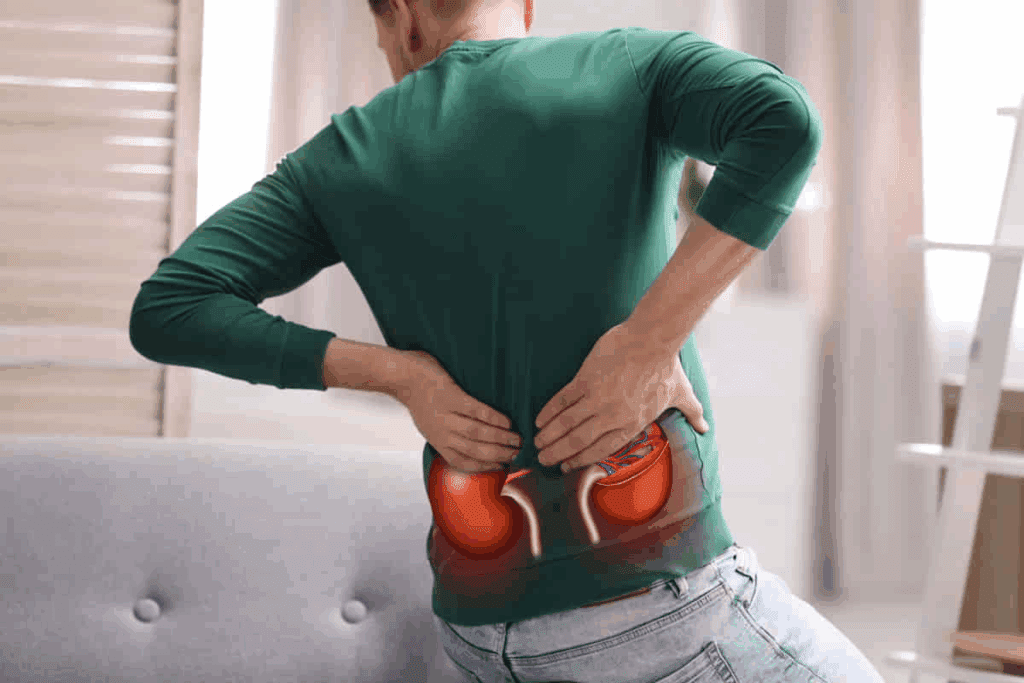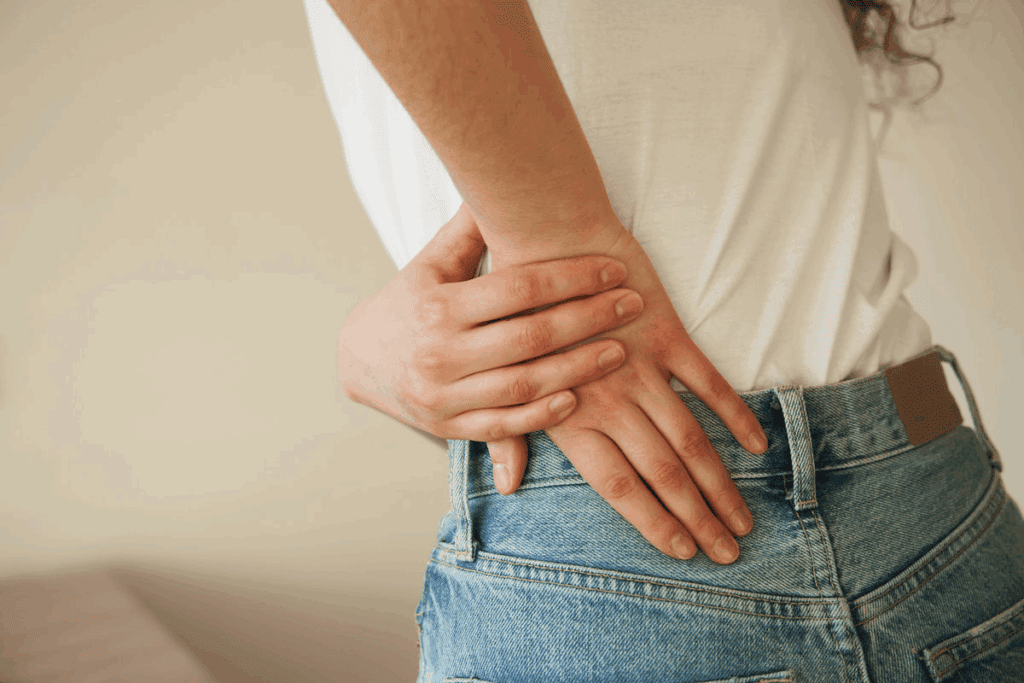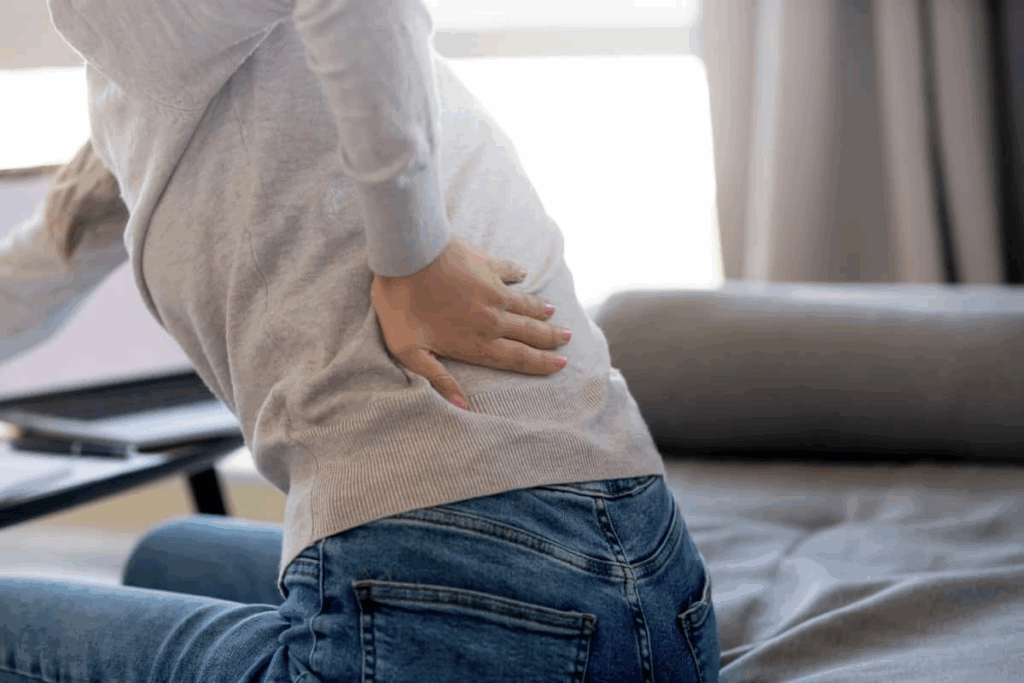
Kidney stones are a big health problem worldwide. About can kidney stones cause gas and constipation Diagnostic Challenge: Can Appendicitis Symptoms Be Mistaken for Other Conditions?11% of men and 6% of women will get kidney stones at some point.
Kidney stones are known for causing a lot of pain. But many people also experience gas and constipation. This surprise link between kidney stones and stomach issues can make things harder for doctors.
It’s important to understand how kidney stones and stomach problems are connected. At Liv Hospital, we have a team of experts working together. They focus on the relationship between kidney stones and issues like gas and constipation.

Kidney stones are hard deposits made of minerals and salts. They form inside the kidneys. These stones can be as small as a grain of sand or as big as a golf ball.
Kidney stones are made of minerals and salts found in urine. The most common minerals are calcium oxalate, calcium phosphate, uric acid, and struvite. They form when urine’s composition is off balance, causing minerals to crystallize and stick together.
There are several types of kidney stones, each with different causes and risk factors.
Several factors can increase the risk of developing kidney stones. These include:
Understanding these risk factors and the types of kidney stones can help in preventing their formation and managing symptoms if they do occur.

It’s important to understand who gets kidney stones and why. This helps us find ways to prevent them. Kidney stones affect people all over the world in different ways.
About 11% of men and 6% of women will get kidney stones at some point. This shows how big of a problem kidney stones are for many people.
Studies have found that more people are getting kidney stones than before. This is likely because of changes in what we eat, how we live, and our environment.
The biggest risk for kidney stones is between 30-60 years old. This age group is more likely to get them because of their diet, how much they drink, and body changes.
As we get older, our risk of getting kidney stones goes up. This is because our urine chemistry changes and we might have more health problems.
Where you live and what you eat also affects your risk of kidney stones. Places that are hotter have more kidney stones because people lose more water through sweat. This makes their urine more concentrated.
What you eat is very important too. Eating a lot of animal protein, sodium, and sugary drinks can increase your risk. But eating more fruits, vegetables, and whole grains can help lower it.
“A diet high in animal protein can increase the risk of kidney stone formation by increasing the concentration of calcium, oxalate, and uric acid in the urine.”
| Risk Factor | Influence on Kidney Stone Formation |
| Diet High in Animal Protein | Increases urinary calcium, oxalate, and uric acid |
| Low Fluid Intake | Concentrates urine, increasing stone formation risk |
| High Sodium Intake | Increases urinary calcium excretion |
It’s important to know the signs of kidney stones to get help quickly. These stones can cause many symptoms, affecting different parts of your health.
The pain from kidney stones is usually very bad. It starts in the lower back or flank. Then, it can spread to the groin or belly as the stone moves.
This pain, called renal colic, can come and go. It can also change in how bad it feels.
Kidney stones can also lead to urinary symptoms. You might see blood in your urine, or it might change how often you need to go. You might also feel a burning feeling when you pee.
Systemic symptoms can happen too, like if there’s an infection with the stone. You might feel sick to your stomach, throw up, have a fever, or feel cold all over. These signs mean you need to see a doctor right away.
The table below lists common symptoms of kidney stones:
| Symptom Category | Common Symptoms |
| Pain Patterns | Severe pain in lower back, flank, or groin; renal colic |
| Urinary Symptoms | Hematuria, changes in urination frequency or urgency, difficulty urinating |
| Systemic Symptoms | Nausea, vomiting, fever, chills |
Knowing these symptoms helps doctors diagnose and treat kidney stones better. If you’re showing any of these signs, get medical help fast.
The Digestive System and Kidney Function: An Overview
The kidneys and digestive system are closely linked, both in structure and function. This connection is key for treating kidney stone patients and their digestive issues.
The kidneys and intestines are very close in the belly. This closeness means problems in one can affect the other. For example, kidney stone pain might change how someone eats, impacting digestion.
The kidneys and digestive system work together in many ways. The kidneys help keep electrolyte levels balanced, which is vital for digestion. On the other hand, how well we digest food affects the kidneys’ work and health.
Kidney problems, like stones, can mess with bowel movements. This can cause constipation and bloating. The pain from stones might make people eat differently, leading to constipation. Also, the body’s reaction to stones can cause inflammation and change how the gut moves, affecting digestion.
| System | Function | Impact of Kidney Issues |
| Kidneys | Filtering waste and excess fluids | Impaired waste removal can lead to toxin buildup, affecting digestive health |
| Digestive System | Absorbing nutrients and water | Changes in diet and gut motility due to kidney issues can cause constipation and bloating |
Healthcare providers can manage kidney stone patients better by understanding the kidneys and digestive system’s connection. This approach helps tackle both kidney problems and digestive issues effectively.
Kidney stones and digestive issues like gas and constipation are getting more research. We’ll look into how kidney stones might indirectly cause these symptoms.
Kidney stones mainly affect the urinary system. But, they can also affect the digestive system indirectly. The pain from kidney stones can change how we eat and drink, leading to constipation.
Kidney stones don’t directly cause gas and constipation. But, the body’s reaction to the stones and pain can make these issues more likely.
Studies have looked into the link between kidney stones and digestive symptoms. They found that people with kidney stones might get constipation more often. A study in the Journal of Urology showed that kidney stone patients had more constipation than others.
Also, research shows that constipation is common in those with chronic kidney disease. It’s found in 14.2% to 90.3% of patients, showing a strong link between kidney issues and digestive health.
Constipation is more common in kidney disease patients than in the general public. It’s due to less fluid, certain diets, and some medications that slow down bowel movements.
Constipation can make kidney stones worse by making urine more concentrated. This creates a cycle where kidney stones cause constipation, and constipation increases the risk of more stones.
It’s important to understand this complex relationship to manage kidney stone disease and digestive symptoms well.
Kidney stones and constipation are linked by several key factors. Knowing these factors helps us find ways to manage constipation in those with kidney stones.
Pain from kidney stones can change how people eat. They might eat less or avoid certain foods to feel better.
This can lead to eating less fiber. Fiber is important for regular bowel movements. Patients often choose bland, low-fiber diets, making constipation worse.
Opioids, used for pain, can slow down digestion. This makes constipation more likely. Many patients experience constipation from opioids.
“Opioid-induced constipation is a common and distressing side effect that can significantly impact a patient’s quality of life.”
It’s important to balance pain relief with avoiding stomach problems when treating kidney stone patients.
Dehydration also plays a big role in constipation. When we don’t drink enough, our urine gets more concentrated. This makes our stools harder and drier, making it harder to go.
We suggest that patients with kidney stones drink enough water to avoid constipation.
In summary, constipation linked to kidney stones comes from many sources. These include changes in diet due to pain, side effects of medication, and dehydration. Understanding these helps us find better ways to manage constipation.
How Kidney Stones Contribute to Gas and Bloating
Kidney stones can cause more than just pain and trouble with urination. They can also lead to uncomfortable symptoms like gas and bloating. This happens due to physical, microbial, and stress-related factors.
A kidney stone blocking a ureter can push urine back up. This puts pressure on the intestines and other organs. It can cause discomfort, bloating, and changes in bowel habits.
The blockage can also cause inflammation and irritation. This makes digestive discomfort worse. We’ll see how kidney stones can affect the digestive system in more ways.
Research shows that kidney stones can change the gut microbiome. This is the community of microorganisms in the intestines. Such changes can affect digestion and lead to symptoms like gas and bloating.
Studies found that people with kidney stones have different gut microbiota. This change can affect how the body processes food. It might lead to more gas and bloating.
The pain and discomfort from kidney stones can cause a lot of stress. This stress can affect the digestive system. It can lead to changes in bowel habits, gas production, and bloating.
Managing stress-related digestive changes is important. Techniques like relaxation exercises and dietary adjustments can help. Understanding how stress affects digestive symptoms during kidney stone episodes is key to effective treatment.
| Mechanism | Effect on Digestive System | Symptoms |
| Physical Pressure from Ureter Blockage | Increased pressure on intestines, inflammation | Bloating, discomfort, changes in bowel habits |
| Altered Gut Microbiome | Changes in gut microbiota, affected digestion | Gas, bloating, digestive discomfort |
| Stress-Related Digestive Changes | Influence on gut function, changes in bowel habits | Gas, bloating, changes in bowel habits |
Getting the right diagnosis is key to tell kidney stones apart from digestive problems. Many patients are unsure if their symptoms come from kidney stones or digestive issues. This confusion can cause delays in treatment and more pain.
Differential diagnosis is a method to find the real cause of symptoms. For kidney stones and digestive issues, we use a mix of clinical checks, medical history, and tests. This helps us pinpoint the exact cause.
We first look at the patient’s symptoms, medical history, and lifestyle. This info helps us narrow down possible causes. For example, a history of kidney stones or certain diets might point to kidney stones.
We suspect kidney stones when patients have sharp pain in the flank or lower back. This pain often spreads to the groin. Symptoms like blood in the urine, urgent need to urinate, and frequent urination are also signs. We also look at family history, dehydration, and metabolic disorders that raise the risk of kidney stones.
Kidney stones can sometimes cause pain in the abdomen, making it hard to tell them apart from digestive problems. So, a detailed check is needed to find the real cause of symptoms.
To confirm kidney stones and rule out digestive issues, we use different tests. These include:
By using these tests together, we can accurately diagnose kidney stones and tell them apart from digestive issues. This ensures our patients get the right treatment and relief.
Treatment Options for Kidney Stones and Associated Digestive Symptoms
Managing kidney stones well means tackling the stones and any digestive issues. We’ll look at the different treatments, focusing on medical help and ways to handle digestive problems.
For kidney stones, doctors use a mix of pain relief, drinking lots of water, and changing what you eat. Pain management is key and might include NSAIDs or opioids. Drinking more water helps flush out the stones.
Small stones might just pass on their own. But bigger stones might need treatments like Extracorporeal Shock Wave Lithotripsy (ESWL) or surgery.
It’s important to handle constipation and gas when you have kidney stones. Eating more fiber and drinking enough water can help. Sometimes, doctors might suggest laxatives or stool softeners.
To avoid gas, try not to eat foods that make gas. Eating smaller meals more often can also help.
It’s important to balance treating pain with keeping your digestive system healthy. Opioids can help with pain but might make constipation worse. We watch patients closely and adjust their treatment to avoid digestive problems.
Using NSAIDs or other pain relievers instead of opioids can help avoid constipation. This is a better choice for some patients.
Knowing when to get medical help for kidney stones is key. We need to watch for warning signs that mean we should see a doctor right away.
Some symptoms mean your kidney stone problem is serious. You need to get help fast. These signs include:
Doctors stress the importance of spotting these signs early.
“Delaying medical care can lead to serious complications, including kidney damage or sepsis.”
It’s hard to tell if you have a kidney stone or a digestive issue. They can have similar symptoms. But, there are clues to help figure out what’s wrong.
Kidney emergencies often have:
Digestive emergencies might have:
When you see a doctor, tell them everything. Share:
Telling your doctor all this helps them figure out what’s wrong. They can then create a good plan to help you.
We’ve looked into how kidney stones and digestive issues are connected. Kidney stones can lead to gas and constipation in different ways. This includes changes in diet due to pain, side effects from medication, and not drinking enough water.
It’s key to understand this connection for better patient care. Doctors can now treat more than just the stones. They can also help with digestive problems caused by the stones.
In short, treating kidney stones and digestive issues together is essential. This approach helps manage both problems effectively. It ensures patients get the care they need for their overall health.
Yes, kidney stones can lead to constipation. This is due to pain that changes what we eat, side effects of medication, and not drinking enough water.
Kidney stones can cause gas and bloating. This happens because of the stone’s pressure, changes in gut bacteria, and stress on the digestive system.
Yes, kidney stones and constipation are connected. People with kidney disease often have trouble with constipation.
Yes, a kidney stone can lead to bloating. This is likely because of the stone’s pressure on tissues and changes in gut function.
Yes, kidney stones can cause gas. This might happen because of changes in gut bacteria during a stone episode and stress on the digestive system.
Signs that need quick medical help include severe pain, trouble urinating, fever, and signs of infection.
Doctors use tests and look at medical history to tell kidney stones apart from digestive problems.
Yes, kidney stones can cause both constipation and bloating. This happens through pain changing our diet and the stone’s physical pressure.
The kidneys and digestive system are closely linked. Kidney problems can affect digestion through shared pathways and close location.
Doctors treat kidney stones with various medical methods. Managing digestive symptoms involves balancing pain relief with keeping the digestive system healthy.
Subscribe to our e-newsletter to stay informed about the latest innovations in the world of health and exclusive offers!
WhatsApp us